
(Previously in the book: For his fifth birthday Herman received a home-made bear, which magically came to life when Herman’s tear fell on him. As Herman grew up, life was happy–he liked school and his brother Tad was nicer. But mama died one night. Papa decided sister Callie should go live with relatives. Tad tore up the burlap bear Mama had made for him.)
In the ensuing, hard depression years, Herman and Tad never talked about what happened to Burly Senior. And, curiously enough, neither did Herman and Burly. From time to time one or the other would wonder what Callie and Pearly Bear were doing, but they never mentioned Papa Bear.
Herman found he liked school very much; in fact, he was very good, always making the best grades in his class. He was very proud of this and bragged to Burly all the time, but he never mentioned it around Tad, for his grades, while not bad, were not the best. Papa never commented on any of his sons’ grades, just writing his name on the cards and sending them back to the school.
“Sometimes I wish papa would brag about me some,” Herman said with a sigh one day after he had taken his report card home. “It would make me feel good.”
“But that isn’t your father’s way, is it?” Burly asked. “So why wish for something that your head tells you will never happen?”
“I suppose you’re right,” Herman replied. “It’s just that the grades make me feel so good. I know I’d feel even better if papa was proud of them.”
Burly was strangely quiet. Finally Herman noticed the silence and looked down at Burly. “Is anything wrong?”
“I think you’re putting too much importance on that report card.”
“What do you mean? Isn’t doing well in school important?”
“Of course,” Burly said. “But have you noticed you only seem to like yourself a lot after you get your report card?”
Herman frowned. “I like myself all the time.”
“I don’t think so.”
“Well, maybe I like myself better after report card time,” Herman admitted. “After all, there it is, in black and white. Herman Horn is smart and he behaves well in school.”
“But one of these days you won’t have it in writing every six weeks how good you are,” Burly debated. “And it will be up to you to like yourself without any help.”
Herman thought a moment and then laughed. “Burly, you’re funny.” Then he forgot about the whole thing.
But Burly didn’t forget it. He knew that Herman was in for some hard time, and he didn’t know how to help him see it. Burly didn’t know how he knew it; after all, he was only a stuffed burlap bear, but he knew it as surely as he knew his papa had disappeared and he might never see his mama again.
Christmases didn’t come to Herman’s house anymore after Callie left for Houston. He didn’t bother to make a card for papa and he didn’t even mention the holidays to Tad. He did talk about it to Burly late at night, and on Christmas Eve he and Burly sang carols softly to themselves. Herman laid back and imagined how Christmas would be one day when he was the papa and he had children of his own.
“No matter what happens,” he whispered to Burly, “I’ll always make Christmas special for my children.”
“I know you will,” Burly replied, cuddling close to him, fantasizing how nice Christmas would be with Herman and his new family, naturally fantasizing that he would be a part of it.
Another numbing year passed, and Christmas was coming upon Herman and Burly again. The now twelve-year-old boy had come upon some red material on the side of the road and was figuring out how to make a hat or coat out of it for Burly. Maybe a muffler, he thought. He was playing with the piece of cloth one Saturday night in the loft as papa and Tad sat downstairs looking at the newspaper. In the last couple of years they had grown closer together as Herman and Burly had grown closer. Herman looked over the edge of the loft at them discussing the world and felt no twinges of jealousy or sadness. He just accepted the fact that papa had found comfort in his nineteen-year-old son.
“The Japs are in Washington talking to the government,” Tad said.
Papa grunted.
“I don’t trust them,” Tad added.
Papa grunted.
“I’d like to kill all of them.”
Herman put the cloth aside, deciding it would best make a muffler and plopped into his bed, gazing out of the window at the cold black sky and the twinkling stars.
“You always eavesdrop on their conversation until one of them says something bad about someone or something else you don’t like,” Burly observed.
“Is that what I’m doing?” Herman frowned. “Eavesdropping? I just thought I was watching my family.”
“Think real hard about it.”
“I guess I am,” Herman confessed with a sigh. “But what’s so bad about that?”
“Nothing, as long as you know that’s what you’re doing.”
Tag Archives: family
Ireland and England with Jerry and Josh–Touring Crazy Town
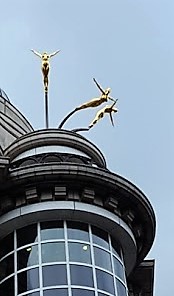
If you are going to one of the most exciting, eclectic cities in the world, go ahead and jump out of the bus into the heart of crazy London town and go for it.
The tour bus dropped us in Piccadilly Circus, and the guides told us to try to keep up. I knew immediately this was going to be difficult because how can you follow two typical English people in a crowd of a hundred thousand typical English people.
For the first thing, I was distracted by this building that had four gorgeous bronze statues of young nubile naked women diving into the center of Piccadilly Circus. Perpetually with their arms extended, up on their tippy toes, backs straight, tummies tucked in and chests proudly puffed out. I may be 70 years old but I’m not dead. By the time I realized I was supposed to be following the group, they were already across the street.
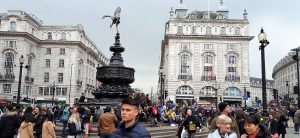
This presented me with my second problem. By nature I am always the one to step back with a smile and allow the cross pedestrian traffic to proceed. I have been known to hold open a door so long, people thought I worked for the store. If I did that in the middle of Piccadilly Circus, I would lose sight of my group and never see the Spanish moss draped live oak trees in downtown Brooksville, Florida, again. Then I remembered the grumpy old Irish woman with her walker in Dublin. I put a scowl on my face, hunched my shoulders and bulled my way forward. Before I knew it I was back with my group and I don’t think they had realized I had gone away.
This was very important to me. I’m old enough to be the grandfather of the young people on this student tour. The last thing I wanted was to have them interrupt their good time to see if the old man was lost, gasping for air, or fallen over with a heart attack. I didn’t want anyone to say, “Somebody call 9-1-1 and get the old geezer off our backs.” (Okay, they were all nice polite young American citizens and they would have never said that—thought it maybe. It’s a joke.)
Speaking of jokes, on the other side of Piccadilly was a street performer who looked just like Mr. Bean and for a modest price you could have your picture taken with him, hug him or pinch his bum. Twenty years and fifty pounds ago I was told I looked Mr. Bean. If I had moved to Piccadilly back then, think of the money and I could have made, and the bruises. Never mind.
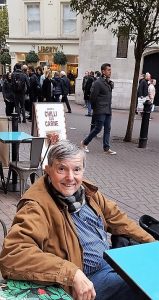
Finally we arrived on Carnaby Street where the tour guides told group members to be back in two hours to eat at an authentic English restaurant featuring Indian cuisine. First Josh and I walked down the street to the largest toy store in London. The entire basement was filled with Star Wars stuff. My son Josh, by the way, goes to Star Wars convention everywhere, so he was in hog heaven (an old Texas expression). I, on the other hand, had reached the end of my tether and decided to go back to Carnaby Street while he explored the other three floors of toy heaven.
For the first time that day I felt entirely in my element. I ordered a nice lemonade, sat on the café patio and watched beautiful people go by as though they were on a runway. Unattractive people were beautiful in their high fashion clothes and perfect hairstyles. Even the boys. I wanted to see Twiggy walk by. Beatle tunes lingered in my brain. Everything was the same as when I was a teen-ager in Texas, except nothing was the same. I was old. And all the fashionable folk had smart phones stuck in their ears.
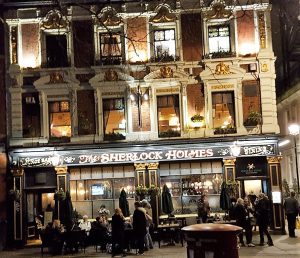
After dinner, the tour guides took us on one last marathon hike through Wellington Circle, past the National Museum and an establishment called Sherlock Holmes Pub. The tour guide said he used to work there. Finally we arrived at the Millennium footbridge over the Thames River where you could see the Eye (big Ferris wheel whose lights were down for the night) and Big Ben (which was covered in scaffolding and couldn’t be seen even if the lights were on.)
Don’t get me wrong. I had a great time. Who gets to walk the streets of glamorous London at night and not get lost? I didn’t have a heart attack. For someone my age that’s a great confidence booster.
Ireland and England With Jerry and Josh Kissing the Blarney Stone
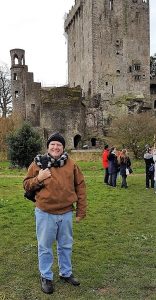
People who know me think my kissing the Blarney Stone is like carrying coals to Newcastle. I’m filled with enough Blarney as it is. (Or is that baloney?)
Like most good tourist attractions Blarney Castle cannot be seen from the road or even before you pay for your ticket to enter. You have to turn a certain corner, and there it is. Like many things on our tour, it was half covered with scaffolding which did not detract from its mythological majesty. Josh and I decided to get in line early before I dawdled too much and started wearing down. He took a quick picture of me when I still felt like smiling. The initial path up to the castle gate was not so bad. We had a great view of the half-demolished castle keep. Then the ascent began. As the docent explained at Bunratty Castle, the stairs were strategically built steep and uneven to slow down the assault of attacking troops. Sometimes they switched from turning right to turning left as they ever went higher. Along the way, the staircase opened to reveal side rooms. I stepped into a couple of them just for the chance to take a breath. That put me behind Josh, but I didn’t mind. How could I get lost? There was only one way up and one way down. Once we were at the top, we waited in line to kiss the stone. In front of me my friend the teacher called across way to my son who had already kissed the stone.
“Where’s your father? He didn’t come up here, did he?”
“Yes, I did,” I called out from behind her.
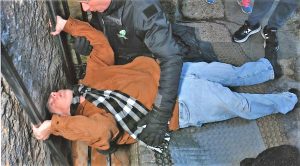
When I got to the stone I realized this area was the target of all the scaffolding. Before the renovations, there had been steel bars below the stone. It would really ruin someone’s vacation to slip from the grasp of the guide and fall into the moat below. In the middle of the renovation a thick plywood board replaced the bars, which took all the fun of leaning over backwards. I didn’t asked but I assumed—and hoped—eventually a nice thick slab of plexiglass would be installed so that you could still see the view upside down but have absolutely no chance of falling to the ground. As an aging male, I wanted all the strangers standing around me to know for certain that I was not afraid. I scooted my old hiney as far off the castle wall as I could before I leaned back. Unfortunately my hiney went so far off the edge I had trouble getting my head down to the legendary stone. Eventually I wriggled my face down and kissed it twice—once for myself and once for my wife Janet who died two years ago of cancer. I loved her but frankly she could have used a bit more blarney. My mission accomplished, I began to sit up and remembered how far out I stuck and I was indeed stuck. I couldn’t move. Luckily the castle guide has seen every combination of discomfort so he had me unstuck and on my way quickly.
The descent was easier, except when I had to put weight on my left knee which was beginning to scream that it wasn’t having any fun. One of the major tenets of the aging male is that you’re not supposed to slow down, grimace, or otherwise show you are in pain. I continued to hop down the stairs like nothing was wrong. Luckily about three quarters of the way I caught up with Josh at the photo stand to see which pictures of me upside I wanted to buy for posterity. Actually this was a perfect opportunity to catch my breath and to let my whiney knee calm down. I decided to buy both. One showed me actually kissing the stone but my face wasn’t showing. The second was slightly pre-kiss and showed that it was, indeed, me smooching the stone.
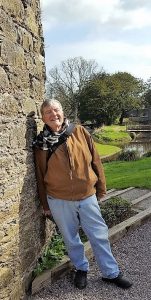
At the bottom, Josh photographed me leaning against an anonymous wall. My smile was not up to its usual standards. Behind me were a myriad of gardens with waterfalls and a garden of poisoned plants. This was necessary when you had a dinner party and wanted the guest of honor to be dead by midnight. I think I disappointed Josh because instead of strolling through the gardens I wanted to get to the nearest pub for liquid refreshment and food.
Here’s a great tourist tip: Anytime you’re thirsty and hungry in Ireland, find the nearest pub. You can’t go wrong.
Ireland and England with Jerry and Josh Jaunting Around Killarney
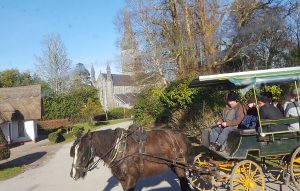
When we finished our tour of the Ring of Kerry, our group decided to jaunt our way through the national park at Killarney. Not jogging. Jogging would have killed me. No, we rode a jaunting carriage pulled by a very hairy horse.
My friend the school teacher who arranged for my son Josh and I to be part of the tour said she hoped this went better than the gondola ride around Venice on one of her student tours a few years ago. The gondolier didn’t sing, didn’t talk about the sights they were passing and didn’t flirt with the women on the boat. What kind of an Italian was he? Our Irish carriage driver invited my friend to sit up front with him and included her in all his comments about the foliage, mountains, lakes and history of old Killarney. I think she came away liking Irish jaunting drivers better than Italian gondoliers.
The jaunting carriage tour began in downtown Killarney, turned a corner and entered the national park. In my first photo, you can see a touring carriage with Killarney cathedral in the background. I know the jaunting driver looks like me, but I couldn’t be taking pictures of one carriage if I were in another one. What this picture does prove is that I have a lot of Irish relatives in my past. By the way, the cathedral was very impressive. We could see it many miles away before our tour bus even got to the city limits. Many residents of Killarney don’t share the tourists’ appreciation, though. The Roman Catholic Church built the cathedral in the early part of the nineteenth century when Ireland was going through the Potato Famine. The church thought the big cathedral would give the residents inspiration. As I was told by more than one local, they would have preferred a good meal instead.
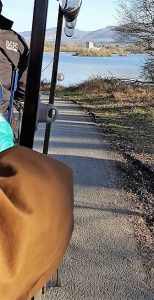
Our gregarious driver told us they had just had a late snow a few days before we arrived. In the distance we could see the mountaintops still covered in snow. He pointed out the little flower bulb sprouts were peeking through the ground and in a few weeks the entire park would be resplendent in color. Several trees had gone down during the storm and they were laying around wondering if they would be eventually cut and carried out or be left to rot and become wonderful mulch. It was still cold when our carriage horse tried its best to avoid the washed-out portions of the road. The sun shone and the wind had disappeared with the snow, so the weather was really quite pleasant, as long as you were dressed in at least three layers of clothes, wore a woolen cap and gloves. Ducks waddling alongside the road didn’t seem mind the crisp air. Neither did the Killarney natives who jogged past us. The second picture shows my elbow which was properly attired in a heavy coat.
At several points we saw crumbled stone ruins hiding among the trees and when we turned a bend in the road we saw an old castle glistening in the sun’s rays as it sat on an island of a long, wide lake.

“I’m sure you’re all wondering what happened to all these homes and castles,” our driver asked in his delightful accent. “Have you ever heard of a man by the name of Oliver Cromwell? He was the Englishman who was responsible for the beheading of Charles the First. He decided the English should come live in Ireland. The only problem with that was the land was already occupied by the Irish. His solution was to kill every Irishman in the country. His army rampaged throughout the island, killing the residents and burning and tearing down their homes. The Irish lords who lived in the castle on the island held out as long as they could but they eventually succumbed. Fortunately the English hated Cromwell as much as the Irish so he was beheaded, and Charles the Second was asked to take the throne.”
I knew the tour was coming to an end because in the distance I saw modern condominium communities on the outskirts of Killarney. You can’t get away from the modern world no matter where you go. That is not an entirely bad thing, however. When we returned to the tour station, we embarked, handed our entertaining guide a tip and found only a few steps away a toilet facility. We climbed onto our bus and on our way to our quaint Irish hotel we passed several outlet malls featuring the latest of everything at the lowest prices. The hotel itself was lovely but challenging. It was several years old, and the owners had added rooms and extra floors wherever it was convenient. My son Josh and I felt we needed a map to get to our beds.
But at least we didn’t have to sleep in a desolate castle destroyed by Oliver Cromwell.
Ireland and England with Jerry and Josh The Rest of the Ring of Kerry
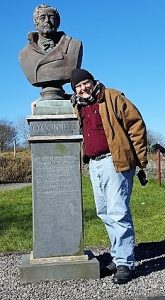
There’s more to the Ring of Kerry than animals, although the animals were very cute.
Our tour guide began talking about a fellow which I understood to be Donald O’Conner who was the father of Ireland. We were going to stop at his birthday place so we could take pictures. Now I thought Donald O’Conner was a great song and dance man. His number in Singin’ in the Rain, Make ‘Em Laugh, was hilarious and when he went through that fake wall, I laughed. But the father of Ireland? Isn’t that taking great entertainment a step too far? It seemed I needed to clean out my ears. The tour guide said Donald O’Connell not O’Conner. O’Connell was born in the seventeenth century and was the first Irishman elected to the British Parliament. That was a big deal since Irishmen couldn’t even vote at the time. So when we stopped I had my son Josh take my photo with Donald’s statue which overlooked the ruins of the house where he was born. He may not have been able to make people laugh but he was able to begin the legal battle for his countrymen’s political rights.
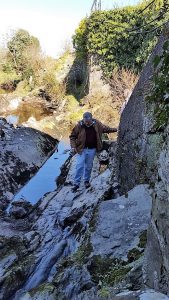
I want to talk about the little town of Sneem again. You know, the one with the mountain goat and the statue of the world champion wrestler. It has a waterfall too. The teen-agers from our group were going down these steep steps to cross the jagged rocks to the edge of the falls. They were laughing and having fun. And I thought to myself, “Why can’t I have the same kind of fun as these teen-agers?” Then I remembered, “Oh. Yeah. I’m 70 years old and have a bum knee.” The other side of my brain reminded me that I wasn’t going to be in Sneem, Ireland, again anytime soon so if I wanted to climb over the rocks to the waterfall I better do it now. When my son saw he wasn’t going to be able to talk me out of this foolishness he decided he’d better come with me to pick up the body when I slipped and fell. Once I got down to the rocks I realized there was more than climbing involved in standing at the falls. There was also jumping from rock to rock. In addition, even though it felt rather warm out that day, the water puddled up between the rocks was frozen. My son took my picture, then told me I needed to get back to the bus before I broke my neck.

I did get a few pictures of Josh, one of them at the Ladies’ View. This place got its name because when Queen Victoria and her entourage came on a sightseeing tour of Ireland this long valley of lakes and streams, her ladies in waiting liked this view the best. They had good taste in scenery. The main reason I included this picture was because of my son. Every time I wanted to photograph him I had to tell him to take off his sunglasses, smile and don’t hold his hands either in front of him or behind him. Just let them hang there. He’s a Florida corrections officer and that pose is the one he takes most often at work.
“I don’t want a picture of Officer Cowling. I want a picture of my son.”
Officer Cowling is a very good state employee. He keeps order at the prison. He is trained in self-defense. I have a better bodyguard than many celebrities. I like Officer Cowling. I trust Officer Cowling. But I love my son Josh Cowling and I want pictures of him.

The weather on our trip was more than we could have asked for. I had several layers of clothing on—everything from my longjohns to heavy boots and coat, scarf and woolen cap because the temperatures were going to be between the 30s and 50s. And Ireland in March is rainy, very rainy. I had an umbrella and rain poncho in my backpack just in case. But not a drop of rain. We became totally aware of how lucky with the weather at lunch on the Ring of Kerry. This restaurant sat on a cliff side overlooking a bay dotted with little islands and outcroppings. The bus driver said if we had come a day earlier we would have seen nothing but fog.
Josh and I grabbed a table next to the long window overlooking the view. Most of the students gathered together along the other wall to giggle and chat. But one boy sat at the next table to us against the window and stared out at the view the entire time. It struck me that he got it. He knew what this trip was all about. I have nothing against giggling and chatting. Some of the best times I have had in my life have been giggling and chatting. But we can giggle and chat anywhere. When you’re on the Irish coast on a clear day in March, you look out the window. When you’re in Sneem, you climb on the rocks. When you’re in the valleys of Ireland, you relax and smile. This kind of stuff doesn’t happen often.
Ireland and England with Jerry and Josh–Land of Animals, Part One
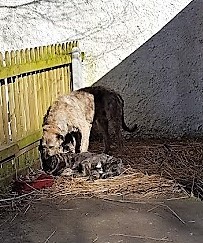
No one should decide on the second day of a nine-day tour of Ireland, Wales and England what their favorite location was, but I did it anyway. Nothing beat the Ring of Kerry near Killarney, Ireland. The ring is an all-day excursion around the perimeter of one of the jagged peninsulas on the west coast of Ireland. The first stop was at the Kerry Bog Village, a restoration of 17th/18th century homes where residents cut blocks of peat out of bogs and dried them to use to heat their houses. Our tour guide said her favorite childhood memory was visiting her grandmother who still burned peat in the fireplace to heat the house. After smelling it, I thought grandma needed to clean the house more often. (Okay, that wasn’t fair. You should have smelled my grandmother’s place out on the plains of Texas. You won’t believe what she used to heat it.)
But the best part of the village was the enclosure where they kept the Irish wolfhounds. You know, they are the size of little ponies and are best to guard all the other livestock who lived there. When I first walked up they were up on their hind feet, staring you in the eye and accepting all the pats and scratches behind the ears they could get. By the time I got my son over to take pictures on his phone, it seems the hounds decided it was break time and they went to the far side of their pen for a mid-morning nap. No amount of cooing, kissy sounds, whistles and sweet entreaties could convince them to come back. No way. Next round of cuddling at the fence began at noon—or whenever—and fans and groupies could come back then. My son got a picture of them on break any way.
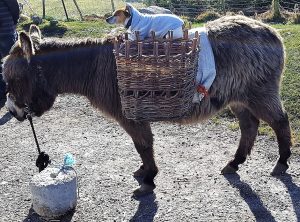
We had not been on the road again for anytime at all when some of the teen-aged girls in the back started going “aww”.
“There’s a dog on the back of a donkey!”
The tour bus driver was a real pro. He knew when people starting oohing over animals on the side of the road he made an unscheduled stop. All the cynical, blasé teens tumbled out of the bus to pet the dog and donkey, who looked bored but used to getting attention from tourists. Even us old people thought they were cute. We got out of the bus and took pictures. A gentleman about my age—meaning he was old, really old—sat on the side with a contented smile and his cap on the ground filled with coins. Several people, of all ages, said the same thing coming back to their seats.
“We can go home now. Once we’ve see the dog on the donkey we’ve seen it all.”
They spoke too soon. The next scheduled stop was only a few miles down the road, a statue of the Virgin Mary on a promontory overlooking an inlet of waves crashing against giant boulders. Scores of birds covered juts of land and islands sunning themselves. This particular statue of Mary was not known for having tears in her eyes, but for actually being observed to move. None of this, however, meant a thing to the people on our bus. As soon as we pulled into the parking lot someone screamed out.
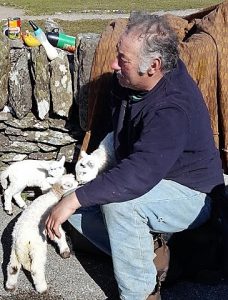
“There’s baby lambs!”
Sure enough, on the outside of the wrought iron fence guarding the statue of the Virgin Mary, was another old man with three or four tiny lambs, not more than a week or two old, scampering around, crawling up into laps and licking as many faces as they could. The only problem was that I didn’t think everyone was going to get to hold a lamb before we were called back to the bus. Being the oldest person there, I resisted knocking children out of the way so I could hold a baby lamb—even though, I must point out in journalistic accuracy, I have never gotten to hold a baby lamb ever in my life. To show I held no misgivings about the turn of events, I did throw a coin in the old man’s hat.
(Author’s note: For the record, I did take a picture of the Virgin Mary statue but decided instead to publish the picture of the lambs. Admit it: you didn’t really want to see a statue of the Virgin Mary. You wanted to see the baby lambs.)
Happiness
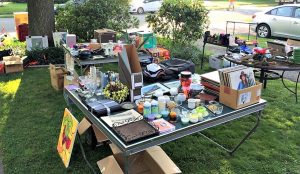
Three days after grandma’s funeral, Jeff began the dreary duty of clearing out her house.
Each room was filled with items bought at yard sales. Jeff knew. Every Saturday for the last three years he had driven his grandmother throughout scattered neighborhoods looking for that one special item that would make her life happy. Usually she found at least two or three items at each sale, and they went to as many sales as they could before grandma had to return home for her afternoon nap.
Stacked on the dining room table were wicker baskets of all sizes and shapes, each one bought to store a specific item.
“This one will be perfect for all the mail that comes in each day,” she told him, “and this one over here will be good to put all the bills in before I mail them out.”
She picked up another basket, saying, “I can put my knitting supplies in this one.”
Another basket was shaped like a swan. “I don’t know what I could put in this, but it is so pretty I cannot pass it up.”
Now all the baskets were dusty as they lay one inside the other. A few had dirty dish towels draped over them, towels which his grandmother fussed about not being able to find. On the floor underneath the dining room table were extra dishtowels grandma had bought to replace the ones she thought she lost.
Jeff walked into the spare bedroom where he began to pack boxes of porcelain figurines, some of Greek goddesses and some of colonial ladies, all of them slightly faded and chipped. If he closed his eyes he could still hear the joy in her voice as she cooed over her discoveries. He even remembered the twinkle in her eyes and the way her bony fingers danced across the porcelain.
It was not that he begrudged the time he spent taking his grandmother from yard sale to yard sale. She had been kind to him when he was a child, and his parents seem to care more about their careers in retail sales. Both of them went from major store to major store– Sears, Ward’s, JCPenney and many others– working long hours for little appreciation and even less income. But grandma always make sure he had all the attention he wanted or needed.
As his grandmother grew older and needed help getting around, Jeff realized the job would be left up to him because his parents still thought one day they would be rewarded for all their loyal service to the big retail stores. So every afternoon after he had spent the day teaching middle school English, Jeff went to his grandmother’s house to see what she needed. Most times she had the local newspaper spread open to the section about yard sales and was planning her route for the weekend.
Jeff sat next to her, pen and pad in hand, to take careful notes. After three years he had every neighborhood in town memorized.
“What I really need,” she confided in a whisper, “is a new bathrobe.”
Jeff just smiled and nodded and wrote it down on his pad, even though he knew his mother had given his grandmother a new bathrobe for Christmas which she had bought on sale at Sears.
After he had packed all the porcelain figurines in bubble wrap and placed them in boxes, Jeff walked into his grandmother’s bedroom and began to take down from the closet all the dresses and coats she had picked up for only 50 cents or a dollar. He knew the exact prices because many of the clothes still had the price stickers on them.
“What did she think he was buying?” Jeff muttered to himself.
By the weekend, he had all of his grandmother’s possessions organized, priced and ready to go on sale in the front lawn. As usual, he had to do all the work by himself because Saturday was always a busy day for his parents at the store. Besides that, grandma was very specific in her will. All the treasures in her home were left to Jeff to do with as he wished. She knew, as stated in the will, he would benefit greatly financially when he sold them. All Jeff really wanted was to make enough money to pay for the classified ad he had placed in the newspaper.
On Saturday morning Jeff sat in a lawn chair, which still had the sticker on which was written 50 cents.
First to go were the wicker baskets.
“I don’t know what I’ll do with it,” an old woman said while holding up the swan to a young woman standing by her side, “but it’s so pretty I have to have it.”
Jeff sold it to her for 10 cents less than his grandmother had paid for it last year.
“You can never have too many rags,” an old man told a little boy standing by him as he grabbed a handful of the older dishtowels. “They’re good for cleaning up around the garage.”
The towels went for one penny each, and how the man’s eyes twinkle as he counted out carefully each coin.
“You see, Billy, this is how you save money.”
By noon Jeff had sold out of all of his grandmother’s treasures and realized what she had been buying all those years at yard sales. It was the same thing these people had just bought.
Happiness.
The Nature of Tears
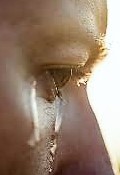 Two years have passed, and I yet have shed a tear over the death of my wife Janet. The other night I watched the Oscars and looked over to her side of the sofa and said aloud what I know what she would have commented on each and every dress. I wrote a play as a benefit for the local free clinic because as a probation officer Janet told her people to go there for help. I still wear my wedding ring. But not a single tear.
Two years have passed, and I yet have shed a tear over the death of my wife Janet. The other night I watched the Oscars and looked over to her side of the sofa and said aloud what I know what she would have commented on each and every dress. I wrote a play as a benefit for the local free clinic because as a probation officer Janet told her people to go there for help. I still wear my wedding ring. But not a single tear.
Thinking back over my life I realize that I have cried very few times out of grief. In fact, the only time I remember was after the funeral of my mother when I was fourteen years old. My crazy brother (no, he really was—in and out of mental hospitals all his adult life) had been very kind and comforting that day, no hysterical fits, no outlandish behavior intended to embarrass me in front of people). I said to him, “I love you,” and broke into tears. Maybe that wasn’t in grief as much as relief that he had stayed sane for an entire day.
Most of the times I cried were out of frustration and anger. People watching this thought I cried because I had my feelings hurt. That wasn’t it. I was mad and wanted to attack the bastard but I knew he was bigger than me. All he had to do is push me down and laugh at me because I wasn’t able to fight back. I could have hit him from behind but then people would think I was as crazy as my brother.
Certain movies had a way of making me tear up, mostly those with happy endings. The worst time was when my teen-aged son and I went to “Field of Dreams.” When the lead character’s father walked through the corn and they started playing catch, I broke down. I never played catch with my father. Of course I embarrassed my son. We had to sit there until the audience cleared out and I had composed myself.
I hated my job at a certain newspaper in the 1970s so much that I cried in the boss’s office. Once again I think it was frustration. Another time I cried when a prominent city’s community theater said it was seriously considering one of my plays. So that was out of happiness. I didn’t cry when they eventually returned it. I was used to rejection by that point.
Most of the time I have been able to choke back the tears. The trick is to keep my damn mouth shut. The less I talk the less likely I am to cry. As the years go by I have been more successful in controlling it, but mostly I’ve convinced myself I’ve experienced everything so emotions have become somewhat of a bore.
One time I choked up still confuses me. It was at the end of my college senior year. I went to the movies alone and ran into one of my former roommates. He was a loud flag-waving bigot. He was very specific about how every other race was inferior to white people, especially to white people of the United States. By the time I met up with him that last week in the movie theater, he seemed to have mellowed out on his political views or at least learned to keep them to himself. When we stood outside the theater after the movie we shook hands.
I was about to say, “Well, see you later,” when it struck me there wasn’t going to be a later. I hadn’t even given a second thought to all the people I had said good-bye to for the last time, but this choked me up. What the hell. I didn’t even like him.
I almost cried over this jerk, but I can’t even work up some tears for my wife of forty-four years. Maybe it’s because I know she’s still inside me and will never leave, so why cry over that?
Burly Chapter Eight
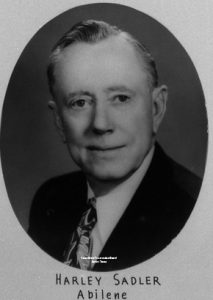
(Previously in the book: For his fifth birthday Herman received a home-made bear, which magically came to life when Herman’s tear fell on him. Herman asked his parents to make burlap bears for his brother and sister for Christmas. As Herman grew up, life was happy–he liked school, Tad was nicer and the tent show was coming to town.)
That night as Herman lay in bed he held Burly close. “Isn’t it exciting, Burly?” He didn’t hold his bear too close because it was hot in the loft. Three small windows were open by each of the beds. Herman slept in his undershorts, but there wasn’t enough breeze to keep him from sweating.
“Yes, it is exciting,” Burly said. “Nice things like that help keep your mind off how uncomfortable the heat is.”
“Tad said this man Harley is real funny. I don’t know what he does exactly, but I can’t wait for us to see it.”
“I’m glad you want Callie and Tad to have a good time too.”
Herman tickled Burly’s tummy. “No, I mean you. I can’t wait for you to see Harley.”
“No, Herman, I can’t go. They won’t want stuffed bears coming to their show.”
Frowning, Herman asked, “Why not?”
“I don’t know for sure. I just know if you asked your father he’d say no.”
Herman slumped down on his pillow. “I don’t know if I want to go if I can’t take you. It won’t be any fun without you.”
“Of course it will.” Burly paused to think. “Imagine how much fun you’ll have telling me all about it later.”
A smile crept across Herman’s face as his eyes fell heavily and a breeze finally blew across the bed.
Wednesday, the day of the tent show came to town, took on the same magical anticipation as Christmas. Each school day wound down slowly, and each chore at home took forever. Instead of twenty spelling words on the final test of the year, Herman could have sworn the teacher called out a thousand. And on the last day of school Herman was sure the teacher moved as though she were plowing through mud up to her waist. He didn’t even care about the grades on his report card, although they were very good.
“Hmph,” Tad said with disdain as he looked at Herman’s card, “grades don’t mean a thing.”
Herman would have been upset if he hadn’t seen Callie smile and wink at him.
Tuesday night was the longest night in Herman’s life, for there was nothing so exciting as the complete unknown. And that’s what the tent show was to him. What did Harley Sadler look like? Was he like a movie star? Big and good looking? Did he have a funny voice? What exactly did make Harley Sadler funny? Herman couldn’t wait to find out.
Tad, Callie and Herman got up early, ate quickly and ran out the door to go to town before the tent went up. As he flew out the door Herman heard his mother cough loudly and deeply. He paused to go back when Tad yelled at him to hurry up.
The hurly burly on the empty field next to the high school was enough to scare Herman, but Callie held his hand so everything was all right. Finally the tent was up and a short, fair man with sandy blond hair sauntered up to the large group of boys and girls eagerly awaiting the word. He had a funny, lopsided kind of grin and a mischievous twinkle in his eyes.
“I don’t suppose I could find anybody here willing to put up a few chairs for me for a ticket to the show tonight?”
‘You bet, Toby!” Tad yelled out with all the other children.
So this was Harley Sadler. He certainly didn’t sound funny. He had a pretty deep voice. And he didn’t really look all that funny. Mostly he looked like a rich businessman. On the other hand, his smile, and the look in his eyes, they were funny, Herman decided. More than that, they were exciting because they hinted at funnier things to come.
“Well, Herman, come on.” Tad tugged at his sleeve. “Let’s go!”
Herman was embarrassed he had been caught gawking at the famous actor, but Harley didn’t seem to mind. He just laughed and patted Herman on the head. There were so many children scrambling for chairs that Herman only got to set up three chairs before they were finished. At first he was afraid he hadn’t done enough work to earn the ticket, but he forgot that quickly as he was the first child Harley gave a ticket to.
“Now hang on to that,” Harley said, winking at Herman.
When all the tickets were distributed Harley said loudly, “Be sure to tell your folks that tonight is ladies night. All women get in free when brought by a man buying a ticket!”
“Oh boy!” Tad exclaimed as they hurried home. “Do you know what that means? It means papa will have to buy only one ticket! Mama’ll get in free!”
“This is going to be so much fun!” Callie giggled as she skipped beside Herman.
Life couldn’t be happier, Herman decided as he looked at his sister’s face and then his brother’s.
“And Burly will get in free too!” Herman chirped, forgetting what his little bear had warned him about the bear’s prediction he wouldn’t be allowed to go.
“Aww, Herman, you’re not going to drag along that toy bear, are you?” Tad moaned.
“If papa says it’s all right, why should you care?” Callie shot back, putting her arm around Herman.
When they came through the front door, they saw their father entering from his bedroom.
“Guess what!” Herman said loudly, “Mama can get in free!”
“Shush,” Papa hushed him with a finger to his lips as he motioned the children to the table to sit down. “Your mama’s not feeling good. She fainted this afternoon.”
“Oh no!” Callie gasped.
“Did you get the doctor?” Herman asked.
“Don’t be dumb,” Tad chided him. “We can’t afford the doctor.”
“That’s right, son,” his father said. “But—but I don’t think she’s too bad. I don’t think though we should go to the show tonight.”
All three children knew better than to protest, but Herman couldn’t help but let out a little groan.
“I know it’s a big letdown—“
“Woody!” mama called out weakly from the bedroom.
Papa stood and went into the bedroom. A few minutes later he came out. Herman tried to figure out what he was going to say from the look on papa’s face, but Herman couldn’t guess what the faraway look on his eyes meant.
“Hmm, your mama says she’s not that bad, that she wants us to go on to the show. She’ll be fine by herself.”
“I could let Burly stay with her,” Herman offered weakly.
Papa looked at him in a blur. “Who? Oh no, that’s all right.” He looked around the room as though he were helpless. “Hmm, Callie help me with supper. Tad, tend the animals in the barn.”
Tad left while Callie and papa turned to the kitchen. Herman quietly went to the loft and got Burly to take to his mother. He slowly opened the door so it wouldn’t creak and stepped in. He approached the bed where mama was sleeping restlessly. The dark spots under her eyes and the paleness of her skin became very real to him for the first time and it scared him.
“Mama?” he whispered.
Her eyes opened and she smiled. “Hi, baby.”
“Would you like Burly to keep you company tonight?”
She laughed and touched his cheek. “No, thank you, honey. It’s so sweet of you to offer.”
The door swung open and Herman heard his father’s voice.
“Herman, I thought I told you not to bother your mother.”
“That’s all right, Woody,” she said softly. “I wanted to see my baby.”
“Get out,” papa ordered. He paused to chuckle a bit. “Don’t you have chores to do?”
“Yes sir,” Herman replied meekly.
He hurriedly returned Burly to the loft and went outside. Supper went by very quietly, almost sadly, considering where they were going that evening. Papa took a tray of food into the bedroom and shut the door, staying with mama the entire meal. After he came out, Callie cast a quick glance at Herman and ventured a question.
“Could Herman take his bear to the show?
Papa turned to look at Callie and then at Herman. “Now why would you want to do that?”
“I don’t,” Herman protested.
“This afternoon he said he wanted to,” Callie replied.
Herman noticed Tad remained quiet during the exchange. He expected his brother to say something mean, but Tad almost never did what Herman expected.
Finally papa announced, “It’s time to go.” He actually was smiling. “Each of you may go in to see your mother, but don’t stay too long.”
“I want to go first!” Tad replied, heading for the bedroom.
“Don’t run and be quiet!” papa reminded him, causing Tad to slow down.
Callie went for a kiss. Then it was Herman’s turn. Mama gathered her baby into her arms and kissed him.
“Have a good time and obey your papa,” she whispered, her breath smelling of some foul medicine.
As Herman came out of his parents’ bedroom he noticed Tad had just come down the ladder from the loft.
“Come on, boys, or we’re going without you!” papa called from outside.
The Late Photographer
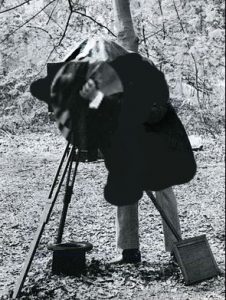
The photographer was late coming to mother’s birthday party, and she was not pleased.
The smallest of things always displeased mother so the use of the word party in connection with any event which involved her became a misnomer. The last people to walk this earth who could please her were her mother and father, and they had passed on years ago to their reward for carefully molding and leaving on humanity’s doorstep such a spoiled brat.
Grandfather had made his money selling shoes that fell apart after a five-mile march during the Civil War. When asked why he would sell such a shoddy product to the United States government he said they were meant for the Cavalry. Grandmother’s family came over on one of the early boats, not the Mayflower but one that came when Massachusetts became more suitable for habitation.
Mother made it a custom to have a photographer to come to her home in the Concord countryside to record for posterity all family gatherings, birthdays, weddings, wakes, Christmas, Thanksgiving, Easter and Fourth of July. Of course, she complained that no one remained straight and still enough for the portrait. She was as stiff as her freshly starched blouses. The only person not criticized for being stiff enough was the guest of honor in the casket at a wake.
“This is inexcusable,” she muttered as she sipped on her lemonade. “I have never had a photographer be this late at one of our events. We can’t cut the cake until the photographer arrives.”
“We just had a horrific summer thunderstorm, Mother dear,” I told her.
“No excuse,” she cut me off briskly. “Anyone of true breeding would have allowed time for such atmospheric disruptions.”
“No one else seems to mind. They’re having a good time talking among themselves.”
“That’s another thing,” she snapped. “They should at least be talking to me about how the photographer has ruined my birthday.”
“The only person who can ruin your birthday is you,” I said, immediately ruing the words that just came out of my mouth.
“I beg your pardon!” She bolted out of her chair and glared at me, all without spilling a single drop of her lemonade.
Fortunately, the telephone rang at that moment and I excused myself to answer it. Everyone in the parlor became silent and stared at me as I spoke into the receiver.
“Yes, yes. This is the Van Horne residence. I am Mrs. Van Horne’s son. Yes, we were expecting his arrival at any moment. Oh. I see. Thank you very much.”
I hung up and turned toward mother, who had already sat down. All the aunts, uncles, brothers, sisters, cousins and grandchildren parted like the Red Sea as I walked back to her.
“I don’t care what his excuse is,” she said, pursing her lips. “I shall never hire him again.”
“Mother, the photographer had a car accident on the way over to the house during the thunderstorm. He’s dead.”
“Well, that’s just another good reason never to hire him again.”